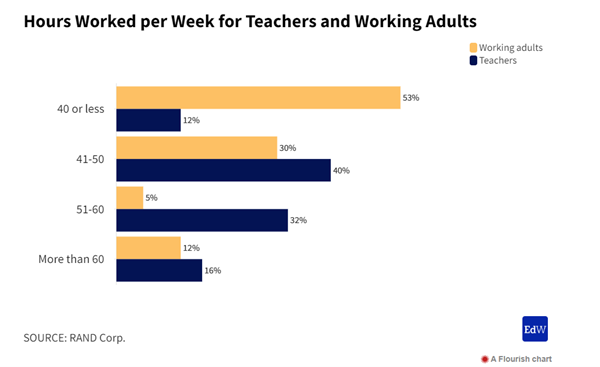That’s the headline from a new RAND survey that highlights the top reason teachers cite when asked if they were very likely or somewhat likely to leave their jobs. While low pay is the second factor cited for why a teacher would leave the profession, dissatisfaction in the workplace outpaced money by 10%.
“The survey shows that pay, hours worked and working conditions are interrelated, suggesting that pay increases alone—without improvements in working hours or conditions—are unlikely to bring about large shifts in teachers’ well-being or intentions to leave the profession,” Ashley Woo, coauthor of the report and an assistant policy researcher at RAND, said in a statement.
The national survey data is a peek into the work window of what is also happening in some Maine school districts. A recent survey of a southern Maine school district indicates teachers are dissatisfied with their working conditions, struggling with increased workload and increased stress, and have an overall feeling of disrespect. Additionally, “too many meetings” and poor work-life balance, along with low pay were all factors leading to dissatisfaction with their jobs.
“This is my 2nd year as a classroom teacher- I honestly do not see myself surviving in these working conditions long enough to reach retirement age. The complete lack of respect for the needs of teachers is disgusting,” said one of the Maine survey respondents.
The southern Maine teachers are not alone with the RAND survey indicating only 1 in 4 teachers were “mostly” or “very” satisfied with the hours they worked in a week compared to other working adults.
Top Reasons Why Teachers May Leave The Profession
(Responses from teachers who said they were “somewhat likely” or “very likely” to leave their jobs at the end of the 2022-23 school year)

Hours Worked Per Week for teachers and working adults
*RAND Survey Results

Only 1 in 4
Nationally, also only 1 in 4 teachers said they were “mostly” or “very” satisfied with the hours they worked in a week, compared with half of all working adults. When it comes to pay, the RAND survey shows that most teachers feel underpaid with only 1 in 3 believing their base salary was adequate, compared to 61% of working adults. How much more would make a difference? Teachers responded saying they would need an average of $17,000 pay increase.
“Snacks, ‘we appreciate you’ emails/meetings, etc. are all lovely but do not address the needs of teachers who are struggling. [These measures assume] that all people need is a pat on the back… the current state of a teacher’s mental health is much more serious than that. Plans that support staff (based on staff feedback), in place and clearly communicated, show support for staff, not words,” added another Maine survey respondent.
Possible Solutions
Increase Pay
A key factor to helping educators is to increase pay overall, not just for teachers but also for support staff. The Maine Education Association continues to work on increasing the minimum starting teacher salary to $50,000 and also increasing the starting hourly rate for support staff to make those jobs competitive with other jobs in the community.
Administrator Support & Educator Voice
MEA members, and the RAND survey authors state that better relationships with administration improve the likelihood that employees will stay on the job. This is not groundbreaking news and is consistent with all other studies on this matter.
However, attaining a better relationship can and should be done through your local union. Finding better ways to communicate, share ideas, and increase educator voice will help build bridges between educators and administrators. Strategies that include professional autonomy and increasing staff to decrease workload, among other things, will help decrease dissatisfaction in the workplace.
For one southern Maine educator the answer to solve a lot of the problems stems from the following comment: “I don’t feel my professional opinion matters at all.”
And changing that can make much of the difference.



